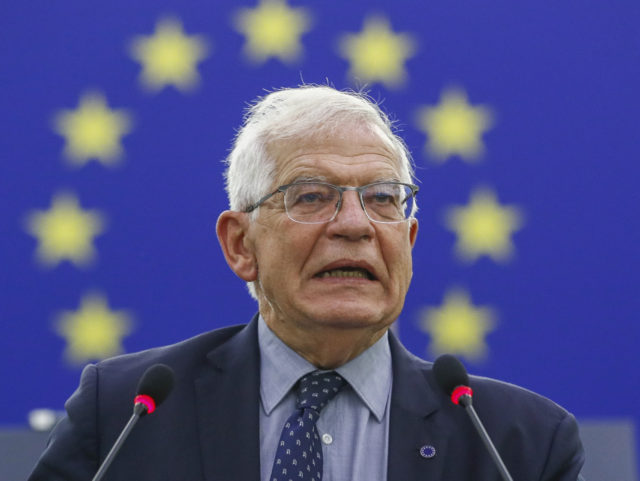The European Union’s High Representative for Foreign Affairs and Security Policy says there is no guarantee that the 27-nation bloc will be able to finalise a new set of sanctions against Russia, with a small group of countries led by Hungary opposing a full oil embargo.
The European Commission proposed a sixth package of sanctions on Russia related to its invasion of Ukraine on May 4th, including a ban on Russian oil imports — but not natural gas imports, on which some bloc’s most influential members, particularly Germany, are heavily reliant.
Hungary is one of a number of landlocked countries that are highly dependent on Russian oil, along with the Czech Republic and Slovakia, with Bulgaria, across the Black Sea from Russia, Russian-annexed Crimea, and Ukraine, also said to have reservations about the move.
In an interview with Hungary’s Kossuth Radio on May 6th, a transcript of which has been seen by Breitbart London, Hungarian prime minister Viktor Orbán complained that the European Commission — an unelected body which serves as the EU’s executive and the primary initiator of EU-level legislation — had announced its oil embargo scheme “[w]ithout having consulted anyone at prime ministerial level… seeking] to impose a single rule on everyone, without taking account of national interests.”
With respect to said interests, Prime Minister Orbán said a Russian oil embargo would be “tantamount to dropping a nuclear bomb on the Hungarian economy,” drastically increasing the cost of petrol and diesel and causing some industrial production plants to “go bankrupt and close down, causing high unemployment.”
Europe’s Russian Oil Embargo Could Lead to Fuel Shortages – Minister Admitshttps://t.co/JTtWAXK06W
— Breitbart London (@BreitbartLondon) May 6, 2022
EU High Representative Josep Borrell said the bloc’s central technocrats would “do our best in order to deblock the situation,” but warned he “cannot ensure that it is going to happen because positions are quite strong” ahead of a Monday meeting between EU foreign ministers which he will chair.
Borrell observed “that some member-states face more difficulties because they are more dependent, because they are landlocked” and that “they only have oil through pipelines, and coming from Russia.”
Lithuania’s Foreign Minister Gabrielius Landsbergis complained “the whole [European] Union is being held hostage by one member-state” — namely Hungary — and that countries like the Orbán-led state were offered a phase out of Russian oil until December 31st, 2024 and that “everybody expected that this would be enough.”
Orbán addressed this supposed concession at length in his Kossuth Radio interview, however, saying that it would require at least five years and trillions of forints — Hungary’s national currency — to adapt its refineries to non-Russian product and transform its pipeline infrastructure, along with increasing nuclear and solar capacity.
Orbán expressed doubt over whether the European Union — which is trying to squeeze Hungary financially over longstanding disputes related its refusal to accept compulsory migrant redistribution quotas and supposed rule of law issues — would provide funding for this transformation, and noted that whatever might be promised “so far we only have this money on paper, because it still hasn’t been given to us.”
Sore Losers: EU Set to Sanction Hungary After Orbán Election Landslidehttps://t.co/VE2InMGzUC
— Breitbart London (@BreitbartLondon) April 5, 2022
The Associated Press contributed to this report.

COMMENTS
Please let us know if you're having issues with commenting.